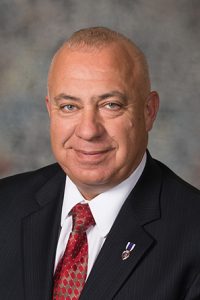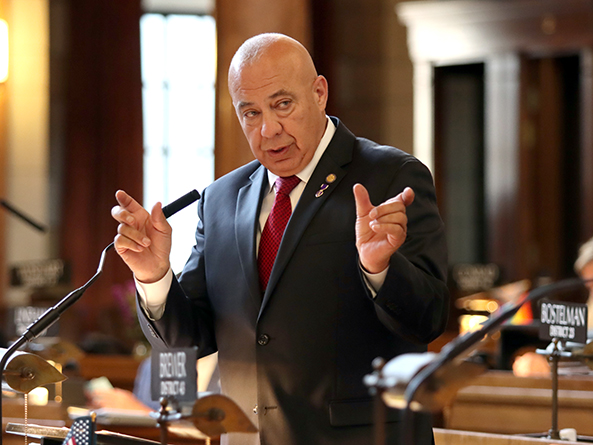Voter ID implementation bill advanced after cloture vote
Lawmakers gave first-round approval May 22 to a proposal that would implement the provisions of an initiative petition approved by voters last year establishing a photo ID requirement to vote in Nebraska.

LB514, introduced by Gordon Sen. Tom Brewer, was the Government, Military and Veterans Affairs Committee’s annual election update and clean-up bill. As introduced, the measure would make a number of technical changes, including updating rules regarding early voting ballot delivery and recall elections.
Brewer, chairperson of the committee, brought an amendment to replace the bill with a proposal to implement voter ID prior to the 2024 election.
Brewer said he and the committee had worked since the start of the legislative session to reach an agreement with Dunbar Sen. Julie Slama — who headed up the successful voter initiative effort and introduced her own bill outlining a voter ID framework — but those discussions failed to yield a compromise.
The result was a situation that no one wanted, he said, with two competing proposals: one from Slama and one from the committee. Brewer urged lawmakers to approve the committee’s proposal in the few remaining days of the 2023 session or face the possibility of a special session this summer.
“It’s not a perfect bill, but it’s a better bill and it’s what we have to do to fulfill our obligation to the people of Nebraska,” Brewer said. “And whether we like it or not, we’re out of time.”
Slama objected to the Brewer amendment on both procedural and substantive grounds, noting that key individuals who backed the initiative were not included in implementation negotiations. Nebraska Secretary of State Robert Evnen was heavily involved in that process, Slama said, and she repeatedly referred to the Brewer amendment as the “Evnen amendment.”
She also argued that groups and individuals historically opposed to voter ID now backed Brewer’s amendment, which she said should lead lawmakers to question the proposal.
“The people who opposed voter ID are now in control of voter ID,” Slama said.
Among other provisions, Brewer’s amendment lays out the requirements for a valid form of photographic identification, which would include a document issued by the state of Nebraska, an agency or a political subdivision of the state, the U.S. military, a Nebraska postsecondary educational institution or a recognized Native American tribe or band.
A hospital, assisted-living facility, nursing home or other skilled care facility record that includes a photo or digital image also would qualify.
The secretary of state’s office would be required to provide a website dedicated to voter ID requirements and procedures and implement a public awareness campaign. No fee would be charged to Nebraska residents for an original, renewal or duplicate state ID card for voting purposes.
The amendment would allow an individual without a photo ID to vote provisionally at the polls if they have a “reasonable impediment” to voting — including disability or illness or lack of a birth certificate or other required documents — or a religious objection to being photographed.
Mail-in ballots would be required to include a copy of the voter’s photo ID or their Nebraska driver’s license number or state ID card number. The secretary of state’s office would be charged with matching that number to photo ID information available in the state’s election database.
Ballots that do not meet these requirements could be “cured” through the election commissioner or county clerk’s office by providing missing information by the Tuesday following the election.
Brewer said the proposal would implement the will of the people while not infringing on the rights of eligible Nebraska voters.
Lincoln Sen. Danielle Conrad, a member of the committee, agreed. She said the proposal “threads the needle” of implementing voter ID in a way that ensures access to the ballot and can be implemented by election officials “without chaos and confusion.”
Conrad said 92 of the state’s 93 election officials signed letters in support of the proposal.
“I vehemently and firmly disagree with voter ID,” she said. “However, I equally find as sacrosanct our duty to facilitate and carry out the will of the people even when we disagree with it.”
A counter amendment offered by Slama also would have allowed student and other photo IDs, but would have required the issuers of those IDs to opt in to a system to verify the citizenship of anyone using them for voting purposes.
Slama said the provision would be more thorough than cross-checking signatures with the state’s existing election database via motor voter information under Brewer’s proposal.
Her amendment would require that a “ballot witness” who is a Nebraska resident or notary public sign the envelope indicating that they had checked the voter’s ID. It also would require the secretary of state’s office to use information from any ID-issuing agency to verify the citizenship of every registered voter prior to Jan. 1, 2024.
Under the Slama amendment, the secretary of state’s office would be authorized to investigate voters suspected of not being citizens. In addition, after each election, the state attorney general would conduct an audit of witness signatures of a “meaningful sample” of mail-in envelopes to confirm the ballot witness’ credentials.
Slama said requiring a voter to provide a driver’s license number on their mail-in ballot was insufficient to accomplish the intent of the initiative, which was to require Nebraskans to present a photo ID when voting.
“This is voter ID without voter ID,” she said.
Conrad opposed the Slama amendment, saying citizenship verification was not part of the initiative petition drive nor the resulting language in the Nebraska constitution. She said Slama’s proposal likely would result in costly, lengthy legal battles for the state.
After Slama’s amendment failed on a vote of 8-22, she offered a series of unsuccessful motions and amendments to extend debate on the underlying bill. After eight hours of discussion, Brewer offered a motion to invoke cloture, adopted 44-2, which ends debate and forces a vote on the bill and any pending amendments.
Following the successful cloture motion, lawmakers voted 44-1 to adopt a committee amendment that added provisions of two election clean-up bills.
LB313, introduced by Kearney Sen. John Lowe, would update the procedure for filling federal congressional vacancies. LB269, introduced by Hastings Sen. Steve Halloran, would return redistricting procedure deadlines to their state prior to an adjustment made in 2021 to accommodate the late delivery of federal census data to the states.
Senators then voted 43-1 to advance LB514 to select file.


